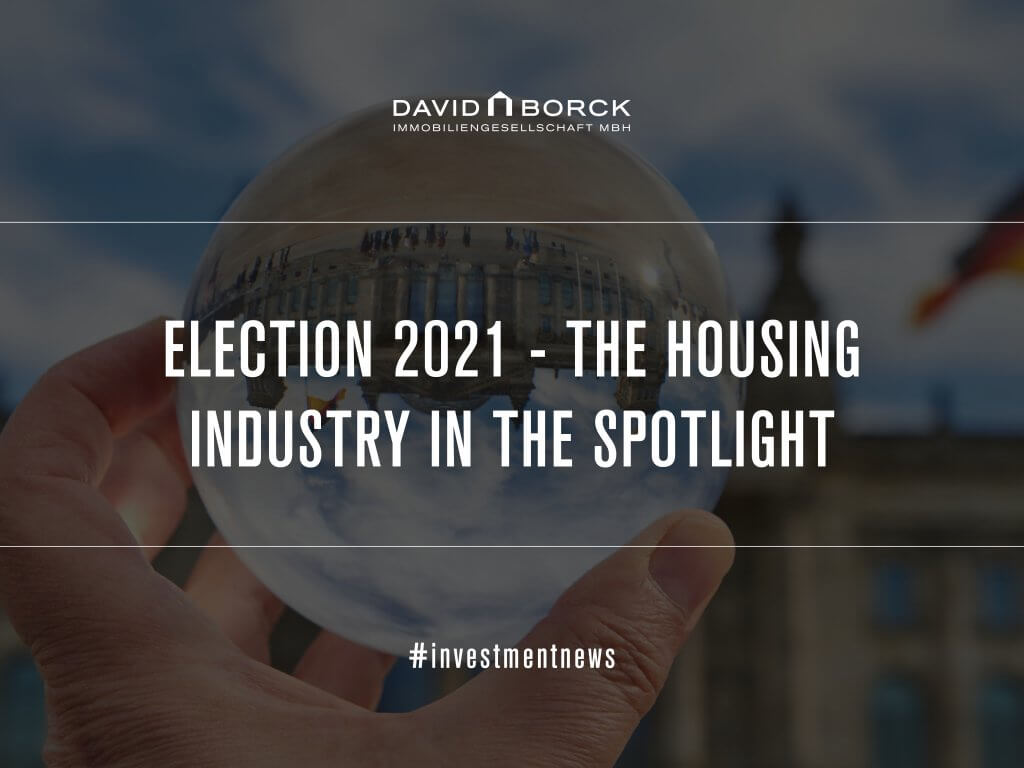
30.06.2021
Investment
Election 2021 – the housing industry in the spotlight
2021 is “Super Election Year”: On September 26, not only will Berliners be voting in federal elections, they will also cast their votes in state and local elections for Berlin’s House of Representatives and district councilors. Unsurprisingly, housing is one of the major campaign issues. Depending on which coalition government secures a majority, property owners, landlords and real estate investors could find themselves having to deal with significant changes. Read on for a closer look at the election promises and policy commitments.
Real estate policy today
As things currently stand, landlords are allowed to raise rents in tight housing markets such as Berlin up to the local comparative rent, but by no more than 15% within any 3-year period. In addition, a temporary rental price brake is currently in force, limiting rents on new leases to a maximum of 10% above the local comparative rent, provided that no exceptional circumstances justify a higher rent. When a property is modernized, landlords are allowed to increase the annual rent by up to 8 percent of the costs incurred for the modernization, although here, too, there are upper limits. The local comparative rent is based on data from the official rent index, which includes rents that have been agreed or adjusted over the last 6 years. Should investors decide to sell their rental property, there is no need to pay capital gains tax after a holding period of ten years from construction or acquisition.
Greens, SPD and Die Linke promise tighter rent brake and tax increases
Germany’s center-left Social Democrat Party (SPD) has adopted a clear position on the permissible level of any rent increases and wants to limit increases to no more than the official inflation rate, which is currently 2.5%. Furthermore, the SPD is planning to tighten the current rental price brake and make it permanent. If the party has is way, the reference period for official rent indexes will also be extended from six years to eight, thereby including lower historical rents and driving down local comparative rents. Sellers could also be hit by the SPD’s plans to abolish the tax exemption for property sales after ten years. The following point could be particularly relevant for investors: The SPD is in favor of a wealth tax of 1% on people with “very high” fortunes of more than EUR 2 million.
The Green Party also wants to limit annual rent increase to a maximum of 2.5%. However, the party is aiming for this fixed percentage regardless of the inflation rate. The party’s election manifesto also proposes a permanent rental price brake and a significant extension of the reference period for official rent indexes, from six years to 20. In addition, the Greens would limit modernization charges to a maximum of EUR 1.50 per square meter. While the party’s plans to abolish Germany’s withholding tax (Abgeltungssteuer) might seem attractive at first, they would return to taxing gains from real estate progressively with the parallel introduction of a new top tax rate. Compared to the Green party’s sweeping proposals, the introduction of a 1% wealth tax on fortunes of more than EUR 2 million seems quite innocuous.
Measured against the other parties’ policy platforms, the left-wing Die Linke party’s manifesto envisages the most serious changes for landlords and real estate investors: In addition to limiting rent increases to a maximum of 2% per year, Die Linke would also replace the current rental price brake with a nationwide rent cap. They would also extend the reference period for official rent indexes to include all past rents. If Die Linke has its way, landlords and property owners will no longer be able to increase rents after modernization measures. The tax exemption for property sales after a decade and the withholding tax would also be scrapped and replaced with a progressive wealth tax, which would see debt-free assets of EUR 1 million, for example, taxed at 5% per year. On fortunes of EUR 2 million and above, Die Linke would apply a one-off levy of between ten and thirty percent to deal with the financial fallout of the coronavirus crisis. If implemented, the levy would be payable in installments over 20 years.
FDP and CDU / CSU want to combat housing shortage
Unlike the other parties, the Free Democrat Party (FDP) is planning only a few changes for the real estate sector. The party wants to tackle the housing shortage by boosting the volume of new construction. At the same time, the FDP is pushing for the abolition of the rent cap and the rental price brake. With an increase in straight-line depreciation for housing investments from two to three percent, the FDP has set its sights on improving the options for depreciation of real estate assets.
The CDU/CSU alliance has adopted a rather cautious approach compared with most of the other parties, although it does clearly oppose the reintroduction of a wealth tax. In addition, the Christian Democrats do not see the rent cap as an adequate means of stabilizing rents. Instead, they advocate creating more living space by promoting new construction and densification measures in metropolitan areas. As an incentive for the construction of new rental housing, acquisition and construction costs would be deductible at an additional 5% after 2021. The increasing relevance of housing is underscored by the call for a federal construction ministry to accelerate housing developments and cut red tape. For existing properties, the CDU/CSU plans to provide tax incentives for energy-efficiency upgrades and refurbishments, although they haven’t yet specified a precise percentage.
Yours
David Borck Immobiliengesellschaft
Schlüterstraße 45 | 10707 Berlin | service@david-borck.de
Telefon +49 (0)30 887 742 50 | Telefax +49 (0)30 887 742 525

 Back
Back 


